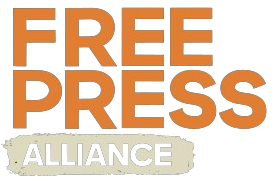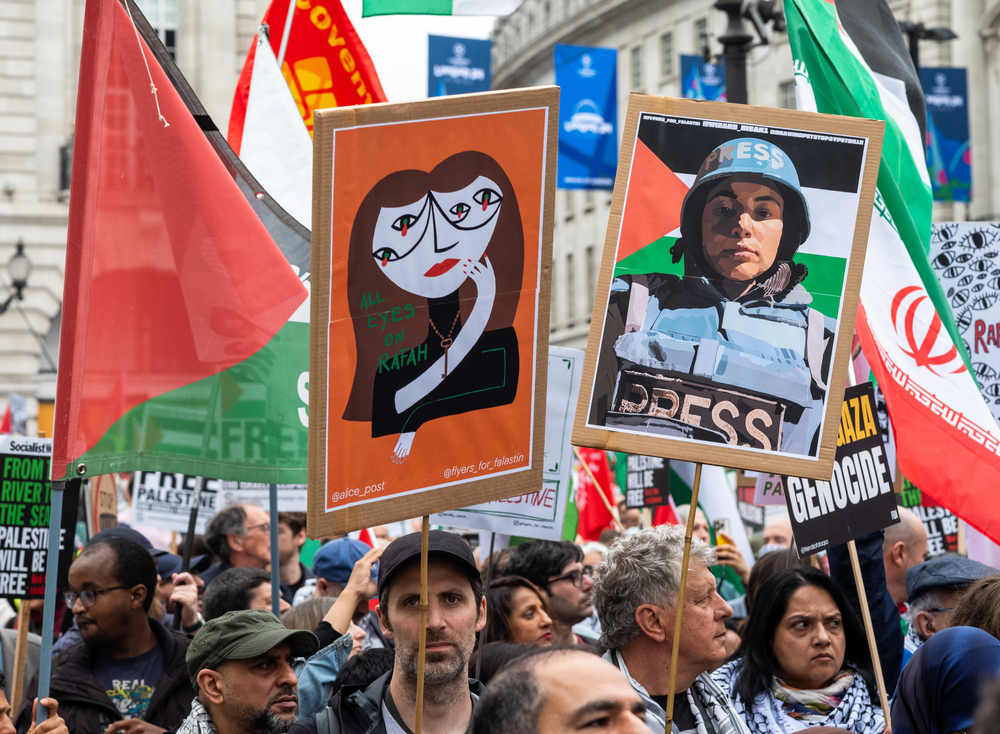One year ago, the first bombs from Israel fell on Gaza, marking the beginning of the war. The conflict between Israel and Gaza is complex, encompassing political, military, and media dimensions, where the repression of press freedom has significantly impacted both local and international journalists. This repression has employed various tactics to limit media coverage and control the narrative presented to the global audience, alongside more brutal actions such as threats and assassinations. Here are some of the ways in which this repression has been carried out:
1. Restrictions on Journalists’ Access
Israel has imposed severe restrictions on journalists’ access, especially during armed conflicts. The Gaza Strip has been described as an “open-air prison,” where journalists and media workers face extreme difficulties entering the area. During escalations, such as bombings in Gaza, Israel has closed crossing points like Erez, preventing international reporters from covering events firsthand. Even Palestinian journalists in Gaza encounter significant challenges, as Israeli authorities strictly control the movement of people and goods, limiting the tools and equipment journalists can access.
2. Attacks on Media Outlets
During military operations prior to the Gaza war, Israeli forces bombed media infrastructure. A notable incident occurred in May 2021 when an Israeli airstrike destroyed a building housing international media office, including Al Jazeera and the Associated Press. Israel justified the attack by alleging that Hamas operatives were in the building, but it did not provide conclusive evidence. Such attacks endanger journalists’ lives and disrupt their ability to report on the ground. As Wael Dahdouh, an Al Jazeera journalist, stated, “I just want to tell the truth so someone can stop this” (El País, 2024).
3. Threats and Violence Against Journalists
Journalists in Gaza, particularly Palestinians, have faced threats, intimidation, and physical attacks. Since the war began, several reporters have been injured or killed while covering clashes. Human rights organizations have reported that Israeli security forces have deliberately targeted journalists wearing vests clearly marked as “press.”
For example, “In January, eleven journalists were killed, including Al Jazeera correspondents Hamza Dahdouh and Moustapha Thuraya, who were traveling by car when an Israeli attack hit their vehicle. In February, another eleven journalists were killed, averaging one every four days” (Reporters Without Borders Spain, 2024).
4. Censorship and Control of Social Media Narratives
Social media has become an information battleground. Israel has exerted strong pressure on platforms like Instagram, Facebook, X, and YouTube to remove or restrict content considered “pro-Palestinian.” Reports indicate that these platforms often remove or reduce the visibility of posts documenting human rights abuses, bombings, or the suffering of Palestinian civilians. Digital censorship has become a powerful tool for controlling the conflict’s narrative and reducing the visibility of Palestinian voices online.
5. Detentions and Imprisonment of Journalists
Palestinian journalists working in the West Bank or within Israel have also faced arbitrary detention. Israel’s use of “administrative detention”—a practice in which individuals can be detained without charge or trial—has extended to reporters covering the conflict. In many cases, these journalists are accused of incitement or posing a security threat, often with minimal or no evidence. Repression also extends to journalists documenting life under occupation in the West Bank, East Jerusalem, and other conflict areas.
6. Control of the International Narrative
At the diplomatic level and within international media, Israel has effectively influenced the narrative of the conflict. Powerful lobbying groups in countries like the United States, the United Kingdom, and other Western nations have contributed to a public discourse that favors Israel’s stance. This has led to media coverage in certain countries that is more sympathetic to Israeli military actions, while Palestinian narratives are often presented as secondary or “biased.”
7. Defamation Campaigns Against Journalists
In some cases, journalists critical of Israeli policies have been targeted by smear campaigns. These campaigns aim to discredit their work, portraying them as biased or as supporters of organizations like Hamas. Such tactics not only undermine journalists’ credibility but also seek to intimidate other reporters from providing critical coverage of the conflict.
Consequences of Repression
The suppression of journalists and press freedom in the Israel-Gaza conflict has profound implications. Limiting broad, objective coverage of events on the ground affects not only public perception of the conflict but also accountability for possible violations of international humanitarian law. The international community and press freedom organizations, such as the Free Press Alliance, have repeatedly called for the safety and freedom of journalists in Gaza and other occupied territories, but the risks and restrictions persist.

